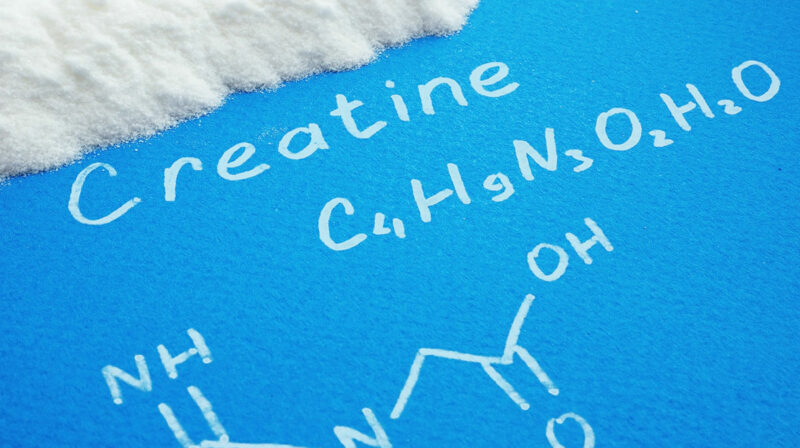Creatine
This article is verified by 8 studies/publications.

Creatine, or methylguanidinoacetic acid, is a substance derived from amino acids arginine, glycine, and methionine. It’s formed in the liver, kidneys, and pancreas, with the daily amount estimated to be around 1 gram[1]. Creatine is mainly found in meat and fish, less so in milk, and barely in fruits and vegetables.
Basics
Creatine is one of the most extensively researched supplements. Nearly 12,000 publications on PubMed are related to “Creatine supplementation.” This high number is because creatine is found in almost all cells in the body, affecting many bodily processes. Most creatine is stored in skeletal muscle, the heart, and the brain, where it helps supply energy.
Creatine phosphate is needed for muscle contractions and nerve function[2], making it popular for enhancing sports performance.
Years of research have confirmed that creatine supplementation positively impacts short-term performance and maximum strength.
Is creatine safe?
The most commonly reported side effect of creatine is weight gain[3], resulting from increased fluid retention[4].
While some associate creatine with serious health problems, specifically kidney function, a closer look reveals these cases are often inconclusive, making it unclear if creatine is to blame.
Elevated creatinine blood levels are attributed to the natural breakdown of creatine to creatinine. However, no adverse effect on kidney function has been found through urinalysis and other methods[5].
A 2003 study found no negative health effects over a 21-month observation period[6].
Overall, creatine’s safety profile at usual doses is quite good. While there’s no absolute certainty due to a lack of double-blind, placebo-controlled long-term studies, reports of potential negative health effects seem to be isolated cases. It’s always wise to listen to your body and consult a doctor if you experience any issues.
Creatine, how much to take?
The question remains: how much creatine is needed to increase strength? It’s important to note that a regular mixed diet, providing between 1 and 2 grams of creatine, fills only 60 to 80 percent of the creatine stores in the muscles[7].
Unfilled storage can be filled with creatine supplementation. There are two common intake schemes:
- High doses of creatine during the first week for rapid storage filling, or
- Consistent daily doses for gradual storage filling over several weeks.
Specifically, the recommendation is 20 g daily (split into four 5 g portions) for a week to fill stores quickly, followed by a maintenance dose of 5 g once a day.
Alternatively, you can start with 5 g daily without a loading phase. This should fill the stores after about 4 weeks, with a continued daily intake of 5 g to maintain the level.
While the loading phase brings faster results, high dosages can negatively affect your digestive system. If you experience gastrointestinal issues, the slower method is recommended.
Discontinuing supplementation leads to creatine stores returning to baseline levels in about 4 weeks, assuming dietary habits remain unchanged[8].
Sources
- Nutritional medicine: according to the curriculum nutritional medicine of the German Medical Association. Hans-Konrad Biesalski (ed.). Georg Thieme Verlag, 2004. S. 236. ISBN 3-13-100293-X
- Intracellular compartmentation, structure and function of creatine kinase isoenzymes in tissues with high and fluctuating energy demands: the ‘phosphocreatine circuit’ for cellular energy homeostasis. T Wallimann, M Wyss, D Brdiczka, K Nicolay, H M Eppenberger. Biochem J. 1992 Jan 1; 281(Pt 1): 21-40. doi: 10.1042/bj2810021.
- Long-term creatine supplementation does not significantly affect clinical markers of health in athletes. Kreider, R. B., Melton, C., Rasmussen, C. J., Greenwood, M., Lancaster, S., Cantler, E. C., Almada, A. L. Guanidino Compounds in Biology and Medicine, 2003, 95-104. doi:10.1007/978-1-4615-0247-0_14
- Creatine Supplementation Increases Total Body Water Without Altering Fluid Distribution. Michael E. Powers, Brent L. Arnold, Arthur L. Weltman, David H. Perrin, Dilawaar Mistry, David M. Kahler, William Kraemer, Jeff Volek. J Athl Train. 2003 Jan-Mar; 38(1): 44-50. URL: https://www.ncbi.nlm.nih.gov/pmc/articles/PMC155510/, retrieved 07/11/2021
- Dietary creatine supplementation does not affect some haematological indices, or indices of muscle damage and hepatic and renal function. Robinson, T. M. British Journal of Sports Medicine. 2000. 34(4), 284-288. doi:10.1136/bjsm.34.4.284
- Long-term creatine supplementation does not significantly affect clinical markers of health in athletes. Richard B Kreider, Charles Melton, Christopher J Rasmussen, Michael Greenwood, Stacy Lancaster, Edward C Cantler, Pervis Milnor, Anthony L Almada. Mol Cell Biochem. 2003 Feb;244(1-2):95-104.doi:10.1023/A:1022469320296
- International Society of Sports Nutrition position stand: safety and efficacy of creatine supplementation in exercise, sport, and medicine. Kreider, R. B., Kalman, D. S., Antonio, J., Ziegenfuss, T. N., Wildman, R., Collins, R., … Lopez, H. L. Journal of the International Society of Sports Nutrition. 2017. 14(1). doi:10.1186/s12970-017-0173-z
- Long-term creatine intake is beneficial to muscle performance during resistance training. Vandenberghe, K., Goris, M., Van Hecke, P., Van Leemputte, M., Vangerven, L., & Hespel, P. .Journal of Applied Physiology. 1997. 83(6), 2055-2063. doi:10.1152/jappl.1997.83.6.2055.